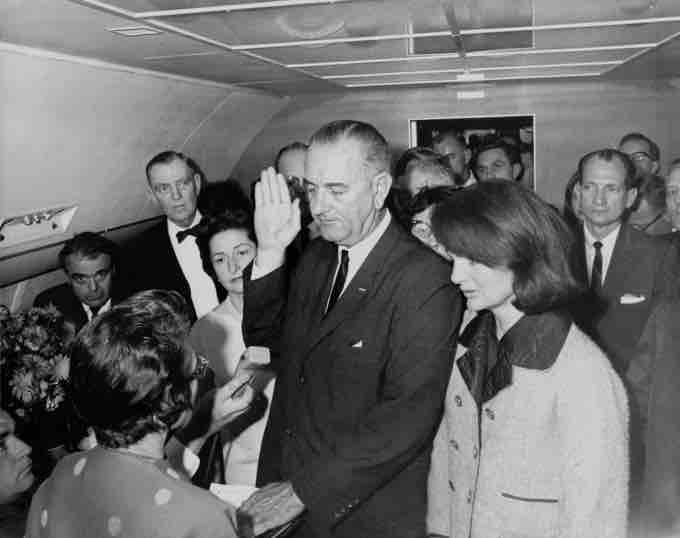Overview
Lyndon Baines Johnson (August 27, 1908 – January 22, 1973), also known as LBJ, was the 36th President of the United States, serving from 1963–1969. Johnson had served as Vice President in the Kennedy administration and assumed the presidency upon Kennedy's death on November 22nd, 1963. Johnson was reelected in a landslide in 1964; however, he did not seek reelection in 1968 on account of his declining popularity. Johnson was renowned for his domineering personality and, relatedly, his great skill in persuading congressmen and other politicians to support him. He accomplished an ambitious domestic agenda, enacting the "Great Society" and "War on Poverty," which were a collection of programs related to civil rights, economic opportunity, education, healthcare, environmental protection, and public broadcasting. Historians argue that the Great Society and War on Poverty mark the peak of liberal policy in the United States and the culmination of the New Deal era. Johnson is rated highly by many historians because of his success in enacting domestic policies.
Lyndon B. Johnson, in the Oval Office.
Former U.S. President Lyndon B. Johnson.
Johnson's Inauguration
Johnson was sworn in as President on Air Force One at Love Field Airport in Dallas, Texas on November 22, 1963, two hours after President Kennedy was assassinated in Dealey Plaza. He was sworn in by Federal Judge Sarah T. Hughes, a family friend, making him the first President sworn in by a woman. He is also the only President to have been sworn in on Texas soil. Johnson did not swear on a Bible, as there were none on Air Force One; a Roman Catholic missal was found in Kennedy's desk and was used instead for the swearing-in ceremony.

Lydnon B. Johnson, taking the oath of office aboard Air Force 1.
Johnson became the 36th President of the United States on November 22nd, 1963, following the assassination President Kennedy. Johnson would go on to win the election in 1964, accomplishing much of his ambitious domestic agenda.
In the days following the assassination, Johnson made an address to Congress: "No memorial oration or eulogy could more eloquently honor President Kennedy's memory than the earliest possible passage of the Civil Rights Bill for which he fought so long." The wave of national grief following the assassination gave enormous momentum to Johnson's promise to carry out Kennedy's programs. Johnson created a panel headed by Chief Justice Earl Warren, known as the Warren Commission, to investigate Kennedy's assassination.
Johnson's cabinet included several members of Kennedy's cabinet. Johnson retained Dean Rusk as secretary of state, Robert McNamara as secretary of defense, as well as Kennedy's secretaries of Agriculture and the Interiror, all for the duration of his presidency. Former presidential candidate Adlai Stevenson continued as Johnson's ambassador to the United Nations until Stevenson's death in 1965. Attorney General Robert F. Kennedy (President Kennedy's brother), with whom Johnson had a notoriously difficult relationship, remained in office for a few months, leaving in 1964 to run for the Senate.
Key Policies
Domestic Policies
Johnson brought to his presidency a vision of a Great Society in which everyone could share in the opportunities for a better life that the United States offered, and in which the words “liberty and justice for all” would have real meaning. One of the chief pieces of legislation that Congress passed in 1965 was the Elementary and Secondary Education Act, increasing federal funding to both elementary and secondary schools. The Higher Education Act, signed into law the same year, provided scholarships and low-interest loans for the poor, increased federal funding for colleges and universities, and created a corps of teachers to serve schools in impoverished areas. Johnson's administration passed other acts to improve transportation, protect the environment, and improve safety standards in food and motor vehicles, to name a few. His war on poverty dominated his presidency and included such acts as the 1964 Economic Opportunities Act, the 1965 Housing and Development Act, and the 1965 Social Security Act.
His Great Society also included passing Kennedy's Civil Rights Act of 1964, the most far-reaching civil rights act yet passed by Congress. The act banned discrimination in public accommodations, sought to aid schools in efforts to desegregate, and prohibited federal funding of programs that permitted racial segregation. Further, it barred discrimination in employment on the basis of race, color, national origin, religion, or gender, and established an Equal Employment Opportunity Commission. These were followed by the Voting Rights Act of 1965 and the Civil Rights Act of 1968.
International Policy
Johnson escalated American involvement in the Vietnam War, reversing Kennedy's policy of disengagement. Under Johnson, American troop presence went from 16,000 American advisors and soldiers in 1963 to 550,000 combat troops in early 1968. American casualties soared during this time. The war stimulated a large, angry antiwar movement based especially on university campuses in the U.S. and abroad.
End of Johnson's Presidency
As the Vietnam War escalated, the money spent to fund it also increased, leaving less to pay for the many social programs Johnson had created to lift Americans out of poverty. Johnson knew he could not achieve his Great Society while spending money to wage the war. He was unwilling to withdraw from Vietnam, however, for fear that the world would perceive this action as evidence of American failure and doubt the ability of the United States to maintain its position as a superpower.
Increasing race riots, rising crime rates, and the ending of the Great Society through the latter years of Johnson's presidency sapped support for Johnson's liberal civil rights and anti-poverty policies and strengthened right-wing calls for "law and order." The Democratic Party split into four factions, and after an embarrassingly poor performance in the 1968 New Hampshire primary, Johnson ended his bid for reelection. Republican Richard Nixon was elected to succeed him. Republicans would dominate the presidency, winning five out of the next six presidential elections, until the election of Bill Clinton in 1992.